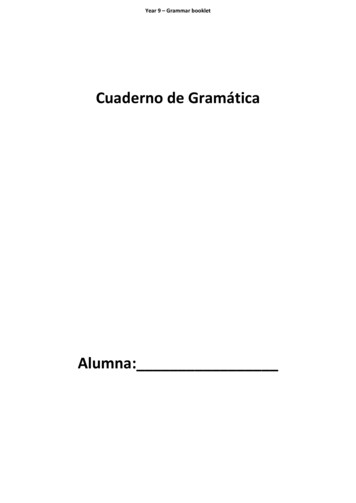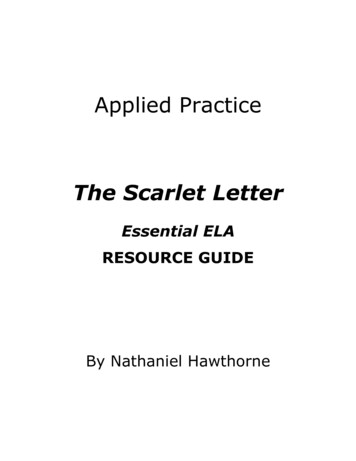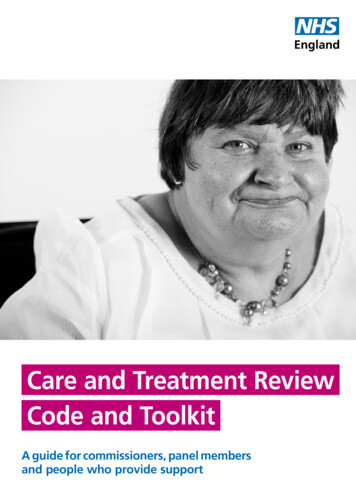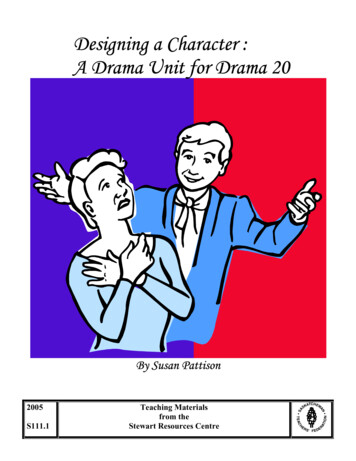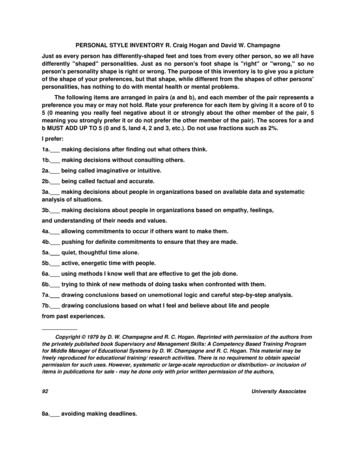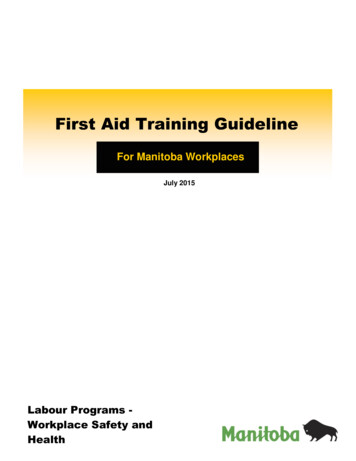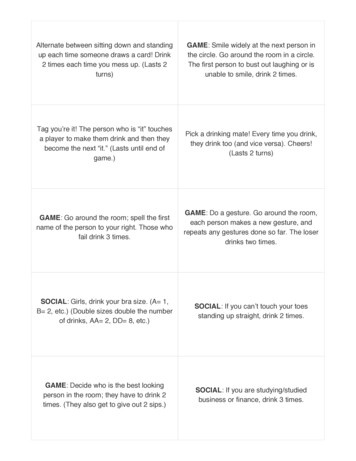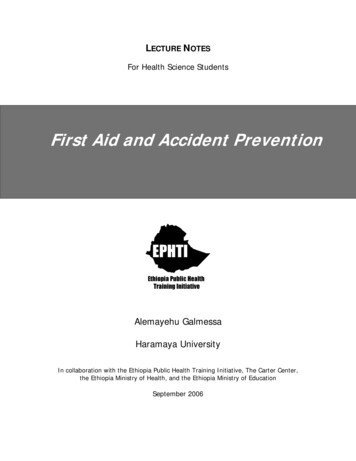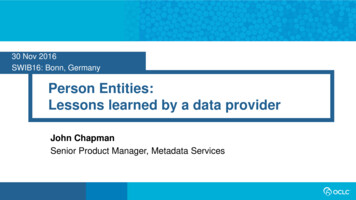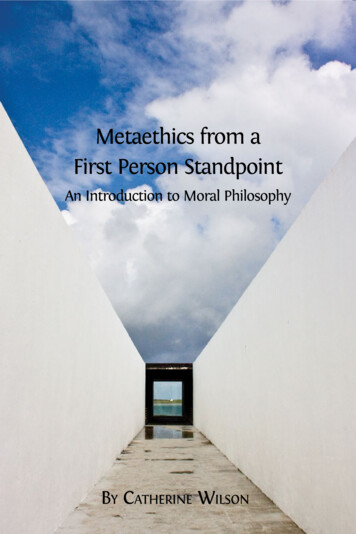
Transcription
Metaethics from aFirst Person StandpointAn Introduction to Moral PhilosophyBY CATHERINE WILSON
To access digital resources including:blog postsvideosonline appendicesand to purchase copies of this book in:hardbackpaperbackebook editionsGo pen Book Publishers is a non-profit independent initiative.We rely on sales and donations to continue publishinghigh-quality academic works.
Catherine Wilson is the Anniversary Professor of Philosophy at theUniversity of York. Catherine has worked in the history of philosophy,moral theory and aesthetics and has taught and published extensivelyin these fields. Her publications include A Very Short Introduction toEpicureanism, Epicureanism at the Origins of Modernity (2008 and 2010), MoralAnimals: Ideals and Constraints in Moral Theory (2004 and 2007) and (with C.Wilson and D. Clarke), The Oxford Handbook of Philosophy in Early ModernEurope (2011).
Metaethics from aFirst Person StandpointAn Introduction to Moral PhilosophyCatherine Wilson
http://www.openbookpublishers.com 2016 Catherine WilsonThis work is licensed under a Creative Commons Attribution 4.0 Internationallicense (CC BY 4.0). This license allows you to share, copy, distribute and transmitthe text; to adapt the text and to make commercial use of the text providingattribution is made to the author (but not in any way that suggests that she endorsesyou or your use of the work). Attribution should include the following information:Catherine Wilson, Metaethics from a First Person Standpoint: An Introduction to MoralPhilosophy. Cambridge, UK: Open Book Publishers, 2016. http://dx.doi.org/10.11647/OBP.0087In order to access detailed and updated information on the license, please 3741984#copyrightFurther details about CC BY licenses are available at http://creativecommons.org/licenses/by/4.0All external links were active on 08 January 2016 and have been archived via theInternet Archive Wayback Machine at https://archive.org/webUpdated digital material and resources associated with this volume are available 1984#resourcesISBN Paperback: 978-1-78374-198-4ISBN Hardback: 978-1-78374-199-1ISBN Digital (PDF): 978-1-78374-200-4ISBN Digital ebook (epub): 978-1-78374-201-1ISBN Digital ebook (mobi): 978-1-78374-202-8DOI: 10.11647/OBP.0087Cover image: Nick Jewell, ‘Tiree Perspective’ (2008), CC BY 4.0. All paper used by Open Book Publishers is SFI (Sustainable Forestry Initiative),PEFC (Programme for the Endorsement of Forest Certification Schemes) and ForestStewardship Council(r)(FSC(r) certified.Printed in the United Kingdom, United States, and Australiaby Lightning Source for Open Book Publishers (Cambridge, UK).
Dedicated to Caroline, Willy, and Harry,my siblings—and friends for life.
ContentsIntroduction and Acknowledgements1Enquiry I5Enquiry II17Enquiry III31Enquiry IV39Enquiry V53The Enquirer finds that the moral opinions and practices of mankind form aconfusing jumble in which, while strong convictions reign, it is hard to see whyany moral claims can claim to be true or to be known by anyone. She decides todoubt everything she has assumed hitherto about moral good and moral evil andher understanding of them.The Enquirer decides to doubt whether any actions, situations, events, andpersons can really be good or bad, right or wrong, morally permissible or morallyimpermissible.The Enquirer continues to ponder the notion of a value-free universe. She comes tothe realisation that the world seems to be saturated experientially and linguisticallywith values. She entertains the possibility that a race of Destroyers of Illusion whouse language differently has discovered that values are unreal and that there areonly likings and dislikings. She discovers nevertheless that she does know at leastone fact about what is good.The Enquirer discovers that, as far as her self-interest is concerned, there are certainthings that are good and bad for her and therefore things she ought and ought notto do. The Enquirer discovers that she can also know something about what is inthe self-interest of other people.The Enquirer discovers that she knows some of the ‘Norms of Civility’ dictating howPerson 1 ought to behave towards Person 2 in certain typical situations and wonderswhy these norms are observed and whether it is always good to observe them.
Enquiry VI63Enquiry VII75Enquiry VIII87Enquiry IX95The Enquirer determines what makes a relationship between Person 1 and Person 2morally significant and investigates the origins of hermoral feelings and attitudes.She then discovers that prudence and self-interest sometimes have a moral dimensioninsofar as they concern the relations between a Present Self and a Future Self.The Enquirer discovers an analogy between the Present Self’s natural and moralconcern for the Future Self and the Narrow Self’s natural and moral concern for theExtended Self of kith and kin. She goes on to ponder whether she has any naturalconcern for Strangers and why she ought to care about them.The Enquirer returns to a consideration of the position of the Destroyers of Illusionto try to determine whether moral claims are nothing more than claims aboutthe likings and dislikings of the person who asserts them, or nothing more thanexpressions of attitudes and the issuing of invitations and commands, withoutany epistemic significance. She comes to the conclusion that the Destroyers lack acoherent position, and she goes on to consider how to think about moral norms anddemands and the possible motives and reasons for being moral.The Enquirer ponders the questions of whether there are moral truths, whetherthere is a method for discovering them, and what the reach and limits of moralknowledge might be. She considers in what sense there has been moral progress andan increase in moral knowledge.SummaryEndnotesSuggestions for Further Study107115117
IntroductionAt every level of philosophical enquiry into moral theory, from theintroductory to the advanced, the question of the objectivity or subjectivityof moral judgements resurfaces. Are there moral truths—or only opinionsand beliefs? If there are such truths, how can we come to know them? Canone coherently deny that any moral opinion is better than any other? Andcould one simply turn one’s back on morality and, if so, what would thisinvolve?Metaethics is the study of these and related questions. Unlike thepractitioners of ‘normative ethics,’ the metaethicist need not take a positionon what anyone may do, or ought to do or is forbidden to do, or on whatis morally right or wrong. He or she is interested rather in how morallanguage and moral thought work, no matter what the contents of anyone’sset of moral beliefs may be or what their practices amount to.My aim in this book is to address the central questions of metaethics andto give serious answers to them. In writing it, I wanted to present a coherentand positive argument for the existence of moral knowledge that wouldbe persuasive in the face of the possibility that morality is both a naturalphenomenon and a human invention. At the same time, I was dissatisfiedwith many textbook presentations of the ‘isms’ of moral theory. It is alltoo easy to lose one’s way in a forest of taxonomy and then to abandon allhope and fall back on dogmatism or nihilism. I had in mind a freer sort ofenquiry and one that would decisively eliminate both of those options.It occurred to me that there was a model that might prove useful. Facingan array of competing claims and systems, and saddled with a scholasticvocabulary that had long supported debate and discussion withoutanswering any fundamental questions about the world, a philosopher hadonce responded by adopting, first, a posture of scepticism—indeed ofhyperbolic doubt. Professing to reject all previous systems, he attempted to Catherine Wilson, CC BYhttp://dx.doi.org/10.11647/OBP.0087.10
2Metaethics from a First Person Standpointderive important results in ontology as well as an understanding of humanepistemological competence by arguing in a strict linear fashion from his‘first-person’ standpoint. Although there is much to dispute as well as toadmire in his argumentation, Descartes’s strategy is agreed to have paidoff handsomely. So I resolved to attempt a similar strategy, inventing anEnquirer who, in a state of uncertainty and confusion, decides to adopt theassumption that nothing is really good or bad, obligatory or prohibited, andthat there is no such thing as moral understanding or moral knowledge.My aim was then to explore this position, which I first extended into aradical scepticism about all values ascribed to a group called the Destroyersof Illusion, to see where it would lead and whether it would run intodifficulties.In considering this nihilistic position, my Enquirer discovers that theDestroyers have gone too far in their claim that we live in a value-freeuniverse in which nothing about goodness and worth can be known. TheEnquirer realises that she is motivated to pursue what’s good for her andable to come to some firm conclusions regarding her own self-interest.She finds that she can also know, in some cases, what’s good for otherpeople whose situations she comes to understand. The Enquirer thenturns to consider the topic of manners—the ‘norms of civility.’ These aresocial conventions specifying how two or more people in certain situationsought to treat one another. The Enquirer perceives that she mostly knowsabout and is mostly motivated to observe these norms, but that, as itemsof knowledge, these conventions have to be learned. Further, acting in amannerly fashion is sometimes inconvenient or contrary to self-interest.The reasons for ‘opting out’ of a local system of what’s considered goodmanners, on particular occasions or altogether, are explored. The Enquirerfinally proceeds to consider morals—which, like manners, concern theinteractions between two or more people and how they ought to treat oneanother. The similarities and differences between manners and morals areexplored in terms of how they become items of knowledge, the motives forconforming to them, and the possible reasons for ‘opting out’ of moralityeither occasionally or completely.In thus reasoning out metaethics from a first-person standpoint, theconclusions my Enquirer reaches are that moral claims are different to mereexpressions of moral feelings and emotional reactions, though they arefirmly tied to our individual and collective preferences; that there are goodreasons both for remaining within the morality system and for sometimes
Introduction3rejecting norms accepted by the ambient culture. Further, my Enquirerdiscovers there is a tendency for moral knowledge to increase when noobstacles are put in its way, and that there is good sense in the notion thatmoral enquiry is aimed at the discovery of moral truths. There is plenty thatis contentious in my construction, as there was in the model upon which itis loosely based, but I hope the line of reasoning can be defended, as wellas challenged, by able students. My overall aim is that readers who haveworked their way through the arguments will decisively set aside the morecommonplace forms of scepticism and moral nihilism to which they wouldotherwise be inclined. Moral confidence, rather than moral certainty, is theepistemological aim.In composing my text, I found that most of the major issues and conceptsof metaethics, ranging from Plato’s worries about the relationship betweenpower and truth, Hume’s account of the virtues, and Kant’s universalisationthought-experiments to contemporary theorising about plans and motives,practical reasons, moral realism, and the Darwinian perspective on humansocial life were raised at one point or another. Rather than seeing thesetreatments as belonging to competing theories, I suggest they individuallycapture different elements of a large and complex picture of moral learning,moral communication, and the progress of moral knowledge. Here, datasources, ideas, and positions are referenced in the endnotes and in thechapter-by-chapter suggestions for further reading. I hope this will makemy book useful in a second respect. I would encourage readers to followup the references that interest them and to study some of the old andnew classics of moral theory and metaethics before, during, or after theirencounter with the present text.Though grammarians will wince at each occurrence, I have occasionallyused ‘they,’ ‘their,’ and ‘them’ for the singular in order to maintain genderneutrality.AcknowledgementsI am grateful to the undergraduate and postgraduate students of RiceUniversity, Houston, Texas and the University of York (UK) who workedtheir way through earlier drafts of the manuscript. Special thanks are dueas well to my referees with their many suggestions for improvement.
Enquiry IThe Enquirer finds that the moral opinions and practices of mankind form aconfusing jumble in which, while strong convictions reign, it is hard to see whyany moral claims can claim to be true or to be known by anyone. She decides todoubt everything she has assumed hitherto about moral good and moral evil andher understanding of them.Tot homines, quot opiniones—as many opinions as men! as the saying goes.Ever since I came to know something of the wider world, I have beencurious about the variety of beliefs and practices that human beings haveaccepted and engaged in. I have been impressed by their variety but alsosometimes troubled by their character.Many of the things people do from time to time for the sake of othersstrike me as noble and heroic. Firemen rush into burning buildings tosave the lives of children and animals. Reporters travel to battle zones inwar-torn countries to inform the world about what is happening there.Politicians defy opposition to demand civil rights for disfavoured groups,and middle-class people sacrifice luxuries to send their children to schoolor to donate to famine relief. In ordinary life, people go out of their wayto help friends and even strangers, giving each other rides to the airport,assisting with the dishwashing, cheering up the depressed and calming theanxious amongst them.Yet just as many of the things people sometimes do seem cruel andshocking, and this has been noted and lamented by philosophers forcenturies. For thousands of years, people have enslaved their fellowhumans to build walls and palaces, to weave textiles, and to farm theirfields.1 Now they are enslaved to manufacture sportswear and electronicequipment. From my readings, I have learned that torture was acceptablejudicial practice throughout the 17th century, and that only a few hundredyears ago in Europe, a criminal could be publically hanged, disembowelled, Catherine Wilson, CC BYhttp://dx.doi.org/10.11647/OBP.0087.01
6Metaethics from a First Person Standpointdrawn and quartered. I know that cockfights and bullfights have beenconsidered amusing by many cultures and that ancient people would cutslabs of flesh off their living cattle to eat.2 Massacres and child armies arewidespread in the contemporary world, as is sex trafficking. The newspaperbrings constant reports of corrupt police officers and politicians. I haveread that the ancient Greeks, with their brilliant mathematicians, poets, andsculptors, left their unwanted babies on the hillside to die or to be pickedup and raised by strangers.3 Detailed reports of the abuse of children andold people in nurseries, orphanages, and care homes hit the papers on analarmingly regular basis. It seems their caretakers, or some of them anyway,think that what they are doing is absolutely fine.I suspect that future generations will look back at some of our currentpractices—perhaps the prison system, factory farming, and the treatmentof workers in the garment industry–with the same disapproval with whichwe look back on the flogging of sailors and draft animals, the slave trade,the mutilation of women’s feet, and the guillotine. Many of these practicesand institutions have been abandoned in parts of the world in which theywere formerly common. But did people discover that there were humanrights nobody had known about before? Will people of the future discovermore rights—perhaps the rights of plants, landscapes, or insects—inaddition to ‘human rights’ and ‘animal rights’? Could we decide some dayin the distant future that we were actually mistaken about some humanrights and come to recognise torture, infanticide, and human sacrifice asmorally acceptable?Meanwhile, there seems to be considerable disagreement about what isacceptable practice right now. Whenever I open a newspaper, columnistsseem to be arguing about moral issues. Can doctors assist people who saythey want to die, or induce abortion in the second trimester of pregnancy?Is there anything wrong with creating animals with human genes, and arequotas for disadvantaged groups fair or unfair? On a personal level, there isthe same controversy and confusion. My vegetarian friends disapprove ofmy carnivorous habits, while I think they are being sanctimonious. We argueover whether one-night stands are fun or hurtful, whether smoking andheroin addiction are just personal choices or morally irresponsible. Some ofthe moral beliefs I held in the past have changed over the years. I used to beindifferent to charity appeals, now I think I should contribute some money. Ihave become more tolerant about some matters, less about others.
Enquiry I7I am aware that I and most other people have visceral responses to thebehaviour of others. I sometimes feel scorn, disgust, horror, admiration, andapproval when witnessing or reading or hearing about others’ behaviour.Such reactions may be accompanied by confident verbal declarations suchas ‘That was an utterly heartless thing to do’ or ‘It was absolutely right of herto resign under the circumstances’ or ‘He is fundamentally untrustworthyand should be shunned.’ Such utterances are considered to express ‘moraljudgements’; they are ubiquitous in conversation and appear in editorialwriting. Sometimes they are said to express people’s ‘moral convictions.’But I have to wonder whether people who say and write such things aredoing more than venting their feelings. Are they actually making claimsthat could be true or false about the actions, events, situations, and personsthey seem to be commenting on? And, if so, are they ever fully justified inmaking such claims? Indeed, I am led to wonder about moral knowledge—whether there is any such thing, and if so, what is involved in having moreor less of it.Does anyone actually know that it is ‘morally good’ to risk one’s life tosave a baby from a burning building and ‘morally wrong’ to leave a babyalone and unfed? Or are we just in the habit of applauding the former andfeeling shocked by the latter? And what about those people in history? Didthey think they knew that it was right and proper to flog their exhaustedcarthorses, though they were in fact mistaken about this and it was neitherright nor proper? Is there a set of moral truths or moral facts that is partlyknown by some people but fully understood by no one? If so, how it ispossible to get to know more of them? And what would be the point ofacquiring more moral knowledge anyway? Is it so important just to ‘beright’?I feel strongly that the current treatment of prisoners is morallyindefensible and that assisted suicide is justifiable if the person askingfor it is in intractable pain, or facing that prospect, or if no one has everemerged from his or her present condition to go on to live a pleasant life. Iam reluctant, though, to say that I ‘know’ these things. Perhaps I should saythat I ‘conjecture’ that the treatment of prisoners is morally indefensible?But this seems to imply that there is a fact of the matter and that someday Imay come to know whether I am right. Really, all I am confident of is thatI feel strongly about certain things, weakly about others, and I notice thatothers feel the same or differently about them.
8Metaethics from a First Person StandpointThe variety and changeableness of moral opinions, then, leads me todoubt that I really know anything about what is morally right, wrong,permissible, forbidden, and obligatory–or indeed what this term ‘moral’really applies to. It also leads me to doubt that anyone else knows betterthan I do. People argue about these subjects, but I find myself sceptical aboutwhether we can get to the moral truth by discussing and debating. In thearguments I have with people about moral subjects, we seem to be givingreasons that explain our feelings about things. Sometimes these feelingschange as a result of what was said in the discussion, but discussing andarguing don’t seem to me much like proving or demonstrating as they aredone in mathematics or like amassing evidence from historical records orlike performing and interpreting scientific experiments.I can appreciate at the same time that the fact that other people believethings that I do not and do not believe things that I do, or that they havedifferent feelings and dispositions from mine, does not imply that everyoneis at sea when it comes to moral matters and that no one’s convictions arebetter than anyone else’s. The fact that people believe different thingsand are not always persuaded by moral arguments might be no moresurprising than the fact that few people can follow mathematical proofsbeyond some elementary level or understand a scientific paper or medicalarticle establishing some important conclusion. There may be actual proofsof moral claims in the theoretical literature that have not filtered down tome.Moreover, despite my sense that moral arguments don’t really establishthe truth or falsity of moral judgements in a knock-down way, somejudgements strike me as better supported by arguments and considerations,whereas others seem to express mere prejudices or superstitions, akin toother non-moral prejudices and superstitions. On matters of health—whatis good for the body—I know that many people are misinformed, believingfor example that eggs and butter are dangerous to them, that getting theirfeet wet can bring on a cold, and that everyone needs to drink two litres ofwater a day. I know these beliefs to be poorly supported by the evidence.Many people are misinformed as well about such matters as climate changeor the effects of punishment. For example, many people doubtless believethat the threat of capital punishment deters would-be murderers, althoughevidence for this claim is lacking. Perhaps some changes in moral opinion,in individuals, or in entire societies are definitely changes for the better,replacing moral error with moral knowledge.
Enquiry I9Yet the observation that people can be misinformed about healthmatters, the planet, or how society works gives me a second reason, besidesthe sheer variety of opinions held by intelligent people past and present,for being uncertain as to whether there can be moral knowledge. Whereconvictions about nutrition or the efficacy of punishment are concerned,there are methods of getting to the truth. Experiment, observation, andanalysis of the data can eventually determine what is the case. Either eggsare conducive to heart attacks, given the existence of certain preconditions,or they are not; either global warming is principally man-made or it is not,and we will eventually know which, or at least some particular opinionson these matters will come to seem outlandish. I do not see, however, howwe could make experiments or observations to establish whether capitalpunishment was right or wrong. Moral convictions do not seem to becausal beliefs about what happens if, or whenever, something else is doneor occurs, or about the powers of certain substances like eggs, butter, andpomegranate juice. If I believe that capital punishment is wrong, I don’tthink that its ‘wrongness’ can be detected by meters or test-sticks or by theeffects of the wrongness on the human organism.But perhaps I am being overhasty in supposing that experiment andobservation, combined with analysis, cannot enable us to decide who isright in any moral dispute and that experiment and observation will neverbe able to do so. After all, it took physics and chemistry thousands of yearsto get off the ground. Perhaps we have slowly been developing methods fordistinguishing moral truth from error, or perhaps we are just on the vergeof developing them. Alternatively, perhaps no complex methodologyis needed. There may be people who are gifted with a particular kind ofmoral sensitivity and insight that enables them directly to perceive themoral qualities of actions, such as their acceptability or their wrongness,in the same way that I directly perceive the blue colour of the sky. Then allwe would need was a method for discovering who these oracular beingsamongst us were. However, I see no way of identifying these experts,especially since those who make a profession out of speaking and writingabout morality tend to disagree with one another.At this point, a third reason for doubting that I have any moralknowledge, besides the variety of opinions and the absence of any agreedupon experimental method for deciding between them, occurs to me.I can imagine various ways in which my individual existence withinhuman society could have come about. A supernatural Being, the Creator
10Metaethics from a First Person Standpointof Heaven and Earth, may have fashioned me or my first ancestors in Itsimage and equipped me with the limbs, organs, and physiology that wouldenable me to survive at least for a time and to perpetuate my kind. Perhapsthis Being has also equipped me with a mind that was stocked with orable to acquire various beliefs about better and worse situations and so tolook to its own self-interest. It is possible that this Being has laid down andrevealed moral commandments that correspond to Its preferences abouthow I ought to behave and that my intuitions about moral right and wronghave also been instilled in me by this supernatural Creator.However, this supposition about the origins of my moral feelings andimpulses raises many questions. Why should a supernatural Being haveboth the power and the desire to do exactly this? Why create a vast universeof billions of solar systems and then, on one tiny planet, create humanbeings to judge, reward, and punish them? Perhaps filling the universewith living creatures expresses this Being’s love of creative activity andIts desire for variety, while Its creation of only one Earth and only oneset of humans expresses a special focus and interest? But if so, it must beadmitted that Its tastes are peculiar. Why do all creatures have finite lifespans and why is death either preceded by old age and decrepitude orexpedited by painful illness and disastrous accidents? A Being powerfulenough to create this vast variety of species is surely capable of making lifehealthy and of infinite duration. Perhaps the love of variety requires death,so as to make room for more different species and it amuses the Being tooutfit each species with beliefs and desires conducive to its preservationonly until it can be replaced with the next generation. Or perhaps this Beingknows that every creature will sooner or later tire of experience and wishfor death as for a long sleep? Another hypothesis4 that would better explainthis situation is that there are many supernatural beings, each creating, indifferent parts of the universe, what they can. The Creator of our world isamusing Itself as children do when playing with their dolls, sometimestenderly and sometimes cruelly.These hypotheses are possible, but I do not judge their probability to behigh. For the great age of the earth, the evidence of multiple extinctions,and the similarity of humans and apes lead me to doubt that human beingswere created from nothing and for some purpose fully understood only bya supernatural Being. I prefer to search for other explanations of how myspecies came into the world, explanations which can perhaps shed some
Enquiry I11light on how I know a few things about what I ought and ought not to doand what is good for me, and also on why I have the moral feelings andmake the moral judgements that I do.Here is another possibility. In the beginning, there were only particlesand forces, or some unknown substrate of both that produced them. Someof the particles combined into atomic and molecular clumps under theinfluence of the laws of physics and chemistry. As crystals, though nonliving, possess the power to draw materials out of solution that replicatetheir structure, I can imagine that such clumps and strings grew and thatpieces broke off and grew into new clumps and strings. Some of these wouldhave had slightly different shapes and physical and chemical properties toothers, rendering them better able to grow and split off and so perpetuatetheir type. While many of these simple entities would have fallen apartor failed to grow or to split, each small difference that conferred stabilityand the ability to copy itself would have been found in greater numbers.By such a process I can imagine that, from crystals, simple forms of ‘life’should have arisen—forms that took in nourishment, grew, reproducedthemselves and, inevitably, worn down by the wear and tear on theirbodies, ceased to function.As time went on, these entities could have developed various tropisms—some moved towards the light, others moved away from it for safety. Andeventually, over the more than four billion years we know the earth to haveexisted,5 more complicated living things appeared which had appetites—they felt a sort of pleasure when satiated and an anxious, unpleasantsensation otherwise that motivated them to hunt or forage for food,
any epistemic significance. She comes to the conclusion that the Destroyers lack a coherent position, and she goes on to consider how to think about moral norms and demands and the possible motives and reasons for being moral. Enquiry IX 95 The Enquirer ponders

